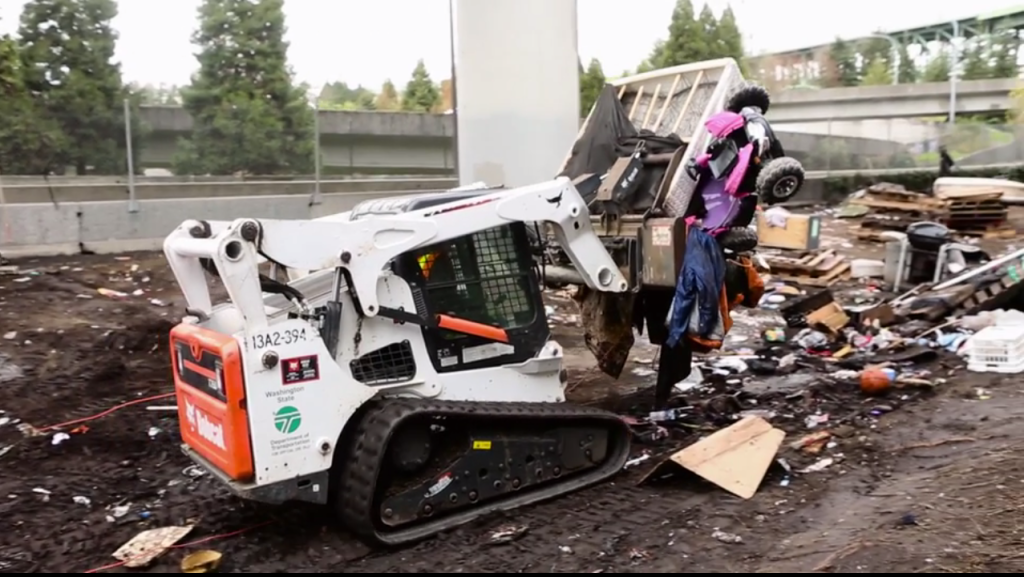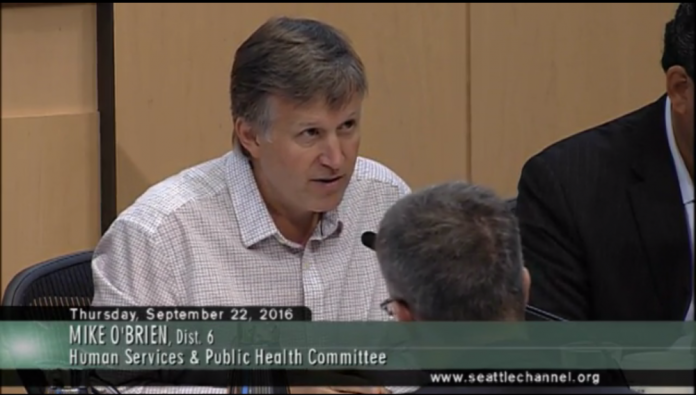The Seattle City Council’s Human Services and Public Health Committee held a special meeting yesterday (video) to consider legislation to make treatment of the homeless more humane by further regulating “sweeps” of encampments on public property. The City Council seems to be making progress in reforming the “sweep” protocols, but that could put Councilmembers on a crash course with Mayor Ed Murray who wants them to fall in line with his approach.
A homeless “sweep” is the City’s euphemism for bulldozing encampments. As you can see in this video, employees pick over camps for perceived valuables before the State transportation officials use Bobcat bulldozers to knock down tents and drop them in dumpsters. A sweep would imply brooms, so remember the operative tool is a bulldozer when I or anyone else uses the term.
Councilmember Mike O’Brien sponsored the bill, which was championed by ACLU of Washington and Columbia Legal Services. The legislation would demand better notice of pending sweeps, would offer better services (i.e. bathrooms to encampments), and would tighten guidelines for storing belongings after sweeps. Moreover, if City staff unlawfully destroy property, the bill in its current form would stipulate that the City pays the owner of that property $250, although councilmember Sally Bagshaw said she opposed the fee as a financial liability on the budget.
Heidi Groover has done great reporting on homelessness and focused a human rights perspective on this topic for The Stranger, so if you haven’t yet checked out her articles like this one from August, you should:
Late last week, Mayor Ed Murray did something he loves to do: He announced a task force to figure out what to do about a problem facing his administration. The problem in question: homeless encampment “sweeps,” the process by which the city forces homeless people sleeping outside to leave their camping spots.
And like Groover, we too give credit to The Seattle Times for solid reporting on homeless sweeps that helped expose how disorganized and perhaps illegal some City “sweeps” had been and put pressure on the Mayor to do more to address the problem. Mayor Murray has frankly not led on the issue in a productive manner. He has however offered plenty of thoughts about how criticism has made him feel in an interview with Daniel Beekman published Sunday:
The mayor partly blames local activists who continue to criticize him for being too hard on people without homes by evicting them repeatedly from camps on public property. They’ve unfairly disparaged him, not knowing that he experienced housing instability himself as a child, and the attacks are weighing on him, he said.
Perhaps the easiest way to take this weight off Mayor Murray’s shoulders is to begin implementing a real solution. Chasing homeless people from one place to another doesn’t serve that goal, as Councilmember O’Brien and many others pointed out. Mayor Murray declared a state of emergency on homelessness last November promising to dedicate more money and attention. Critics suggest he’s used his state of emergency powers to ramp up homeless sweeps.
Mayor Murray seemed to think his plan is the best and only plan: “The one thing I think I offer that no one else has offered is a plan that we’ve spent a lot of time on and that puts us in a situation where we can be successful.” The Mayor’s Pathways Home plan seems like its sets the right goal, focusing money on housing rather than emergency services, and he says the right things in his press release:
There is no question that our system is overly focused on providing expensive, temporary shelter. In fact, seventy percent of our nearly $50 million investment is spent on emergency shelter services. We know, and national experts have confirmed, that emergency responses are not the answer. Every dollar spent on emergency beds is a dollar not spent on strategies that allow people to exit homelessness.
But, while Mayor Murray talks about building housing, he’s busy doing sweeps and trying to push through more without a viable strategy yet in place to house decamped people. Can he build consensus when he’s in the midst of bulldozing camps and playing a shell game with homeless campers?

If housing isn’t a human right, it should be. Mayor Murray is correct: building more housing is the solution. Long-term, an uptick in market-rate housing production could relieve pressure by slowing price increases. In the short-term, we need a government-led solution and significant public investment to house the approximately 3,000 people living on the streets plus the countless thousands on the verge of losing their housing as they struggle to make ends meet while Seattle housing prices skyrocket. Is the Seattle Office of Housing and the City’s non-profit partners up to the challenge of getting 3,000 housing units permitted and under construction as soon as possible and then administering those units?
In the meantime, it makes sense to limit the sweeps, to make encampments more sanitary and livable, and to focus resources on building subsidized housing as rapidly as possible to put a roof over people’s heads. The Housing First model–which does not require sobriety as a condition of residence–will likely be key in getting people to forego the chaotic freedom of camping for the more regimented life in a subsidized unit.
What is clear is what we are doing isn’t working. One could hear that in the devastating testimony given by this formerly homeless woman during Thursday’s meeting (and at 2:36:00 in the video).
A 74 percent rise in housing costs, 3000 people on the streets. 3000 homeless students?! [Sigh] So I offer another view. I woke up, I packed up everything in a bag. I stuffed it away where no one could see it. I went to the restroom because that’s where I was camped by. Got washed up, ready for work. Went back, my bag’s gone. Oh no, my key’s in there for my bike lock. I can’t get to work. Oh no, no. OK I have to go to the bathroom again. I wash up, I come out. There’s a Parks department truck. There’s my stuff. Oh yes! I start to walk towards truck, and a Parks department guy stands in front of me, and he says “what are you doing? Get away from my truck.” I say that’s my stuff right there. He says “I don’t care. I’ve been told to take this, and I’m going to.” I didn’t have any notice. You didn’t even tell me. I stashed it. “You can’t put stuff there.” I said it wasn’t even on Parks land. It was over there. “Doesn’t matter. I saw you. You can’t be here!” Where can I go? “I don’t care. You cannot be here!” He drove off with my stuff. Two days later they came and took my bike. They sawed the lock off and took my bike. I kept my job because I had to go to work. I needed money to get off the street. That happened to me six times that year. I didn’t do anything to you. I have housing now. Thank god. And I am out there helping other people get housing. But if you continue to move them around, I can’t find them to help them.
Doug Trumm is publisher of The Urbanist. An Urbanist writer since 2015, he dreams of pedestrian streets, bus lanes, and a mass-timber building spree to end our housing crisis. He graduated from the Evans School of Public Policy and Governance at the University of Washington in 2019. He lives in Seattle's Fremont neighborhood and loves to explore the city by foot and by bike.


